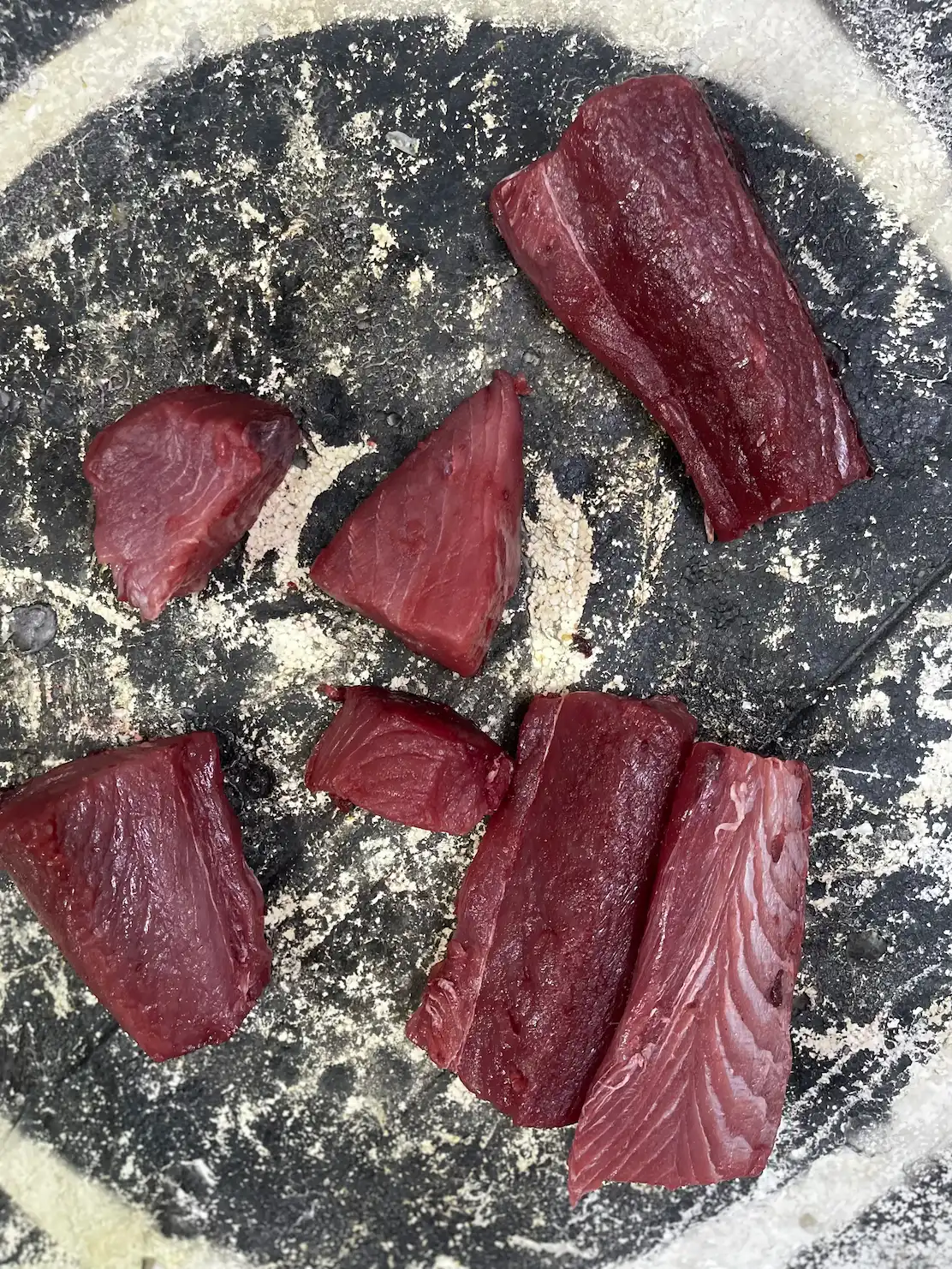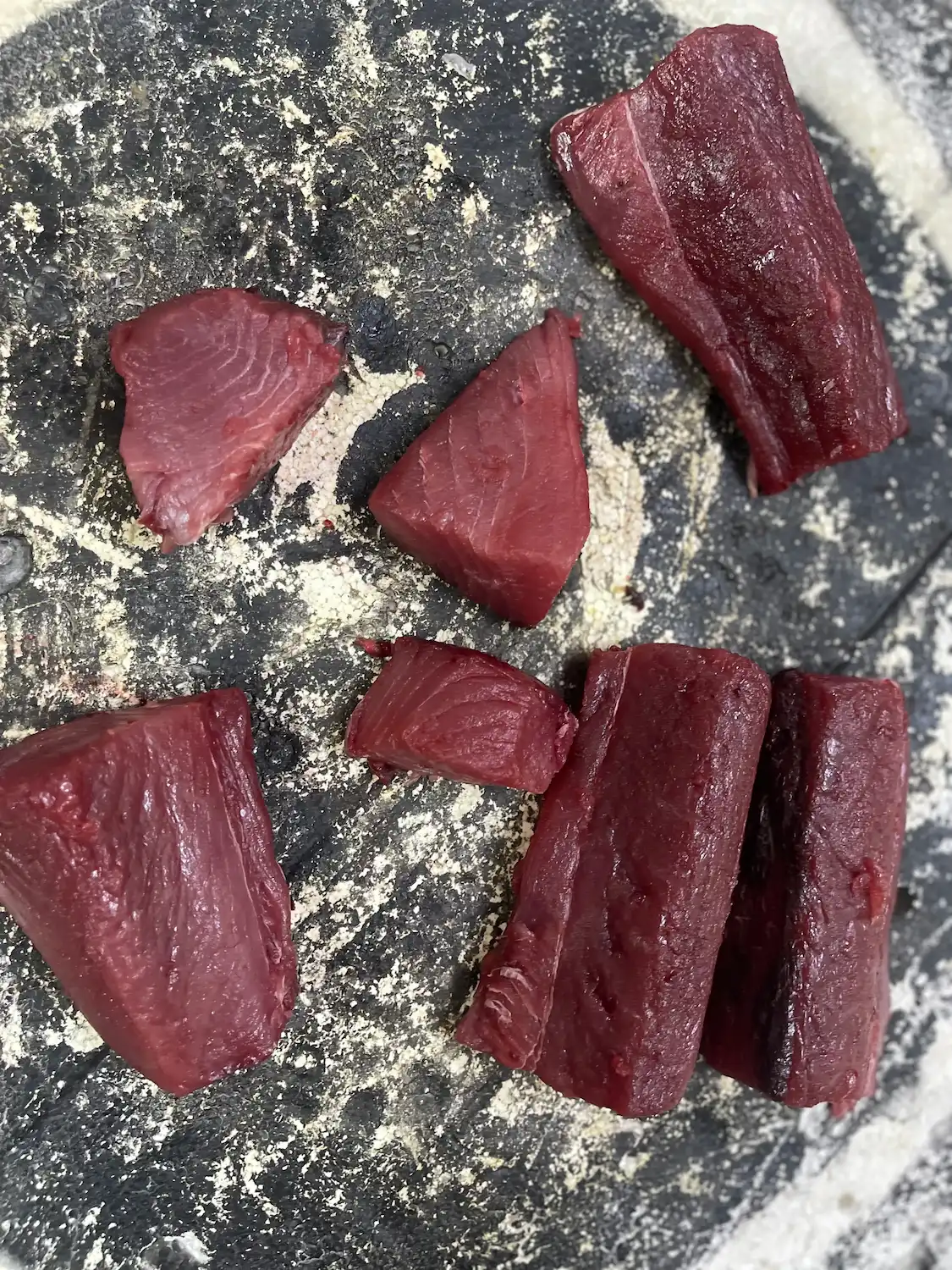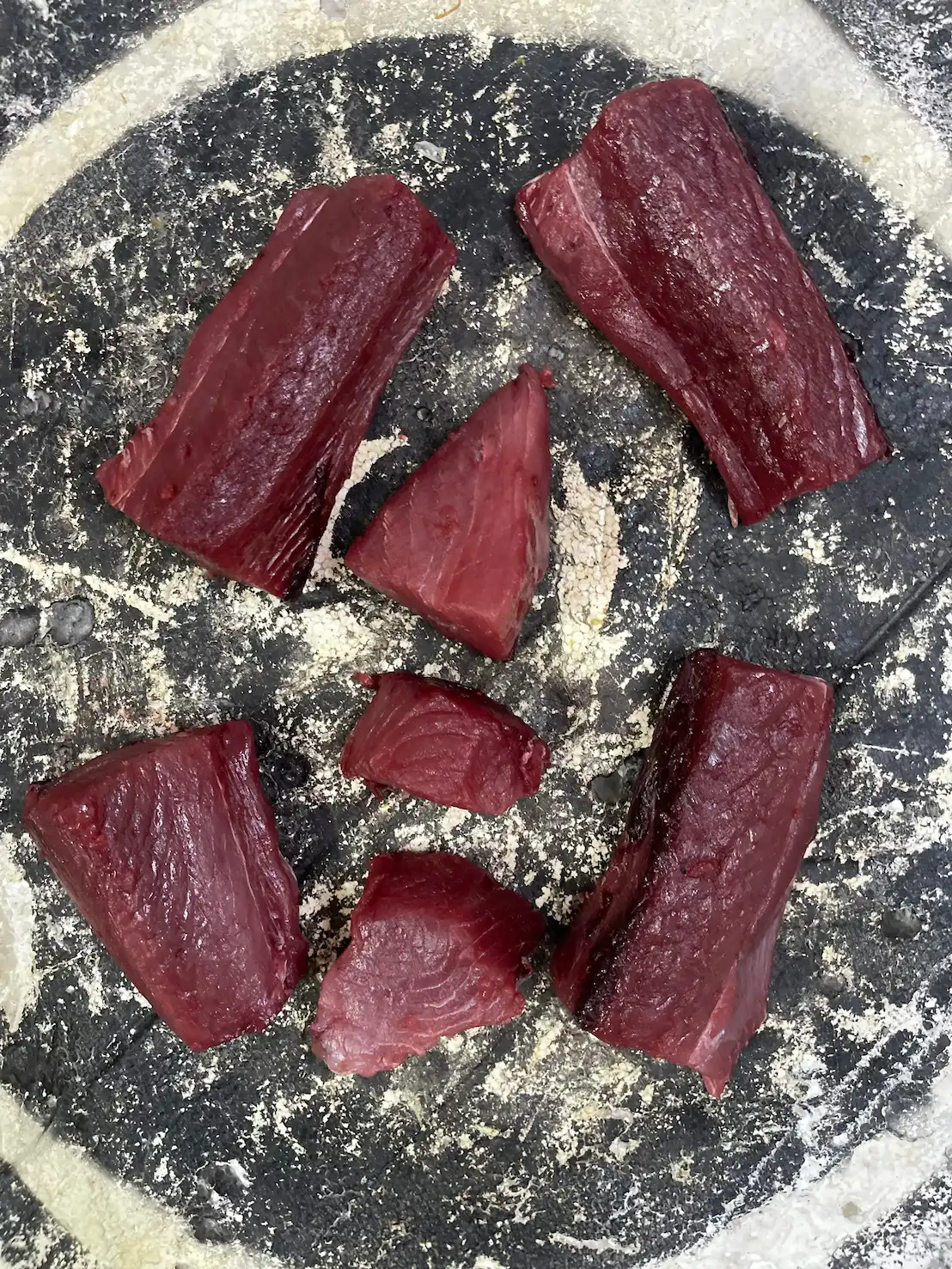Introduction
Tuna (locally: Dawan or Dhawan) refers to several mid-to-large-sized marine species, commonly Skipjack (Katsuwonus pelamis), Longtail/Albacore (Thunnus tonggol), and occasionally Yellowfin or Bigeye tuna in Pakistan. Known for its deep-red “meaty” flesh, it’s a global staple—versatile across steaks, salads, burgers, sandwiches, kebabs, and curries. At Gwadarseafood, our Tuna arrives wild-caught, hygienically processed, and delivered fresh, with no chemical treatments or extended freezing.
Deep Dive: Habitat, Diet & Growth
Tuna are highly migratory pelagic fish, inhabiting tropical and subtropical waters of the Arabian Sea, Indian Ocean, and beyond. They are built for speed, with streamlined, muscular bodies capable of traveling hundreds of kilometers in search of food. Tuna feed primarily on schooling fish such as sardines, anchovies, and mackerel, along with squid and crustaceans.
Yellowfin tuna can grow impressively large—up to 2 meters in length and over 180 kg in weight—though commercial catches in Pakistan usually range between 5 kg and 40 kg. They mature relatively quickly, reaching reproductive size in 2–3 years, which makes them a vital and renewable species in managed fisheries.
Concise Addition: Spawning & Conservation
Tuna spawn multiple times a year in warm waters, releasing millions of buoyant eggs that drift in surface currents. Peak spawning for Yellowfin and Skipjack in the Indian Ocean typically occurs during summer and early autumn. While tuna stocks are actively monitored internationally, overfishing is a recognized concern, and some tuna populations face pressure from unregulated fishing practices. Thunnus albacares is currently listed as Near Threatened by the IUCN, highlighting the importance of responsible sourcing and sustainable catch methods.
Why Tuna (Dawan) Is Worth a Try
High in lean protein (~23–25 g per 100 g) and naturally low in carbohydrates.
Rich in omega-3 fatty acids, known for supporting heart and brain health.
Firm-textured, meaty flesh that holds well to grilling, baking, and pan-searing.
Suitable for a wide range of cuisines—from Pakistani masala steaks to Mediterranean salads.
Offers a bold, distinct flavor that seafood lovers appreciate.
Names & Taxonomy
Common Names: Tuna, Yellowfin Tuna, Skipjack Tuna, Bigeye Tuna
Local Name (Pakistan): Dawan
Scientific Names:
Yellowfin Tuna – Thunnus albacares
Skipjack Tuna – Katsuwonus pelamis
Bigeye Tuna – Thunnus obesus
Family: Scombridae
Order: Scombriformes
Class: Actinopterygii
Sourcing & Catching Method
All tuna sold by Gwadarseafood is wild-caught in the Arabian Sea, primarily off the coasts of Karachi and Balochistan. Fishermen use purse seine nets, handlines, and longlines—methods aimed at maintaining quality and minimizing bycatch. Fish are bled, gutted, and chilled promptly on board to preserve texture and flavor. Processing is completed within hours of landing to ensure maximum freshness.
Physical Traits & Texture
Tuna have streamlined, torpedo-shaped bodies with metallic blue backs and silvery bellies. Yellowfin are distinguished by their long, bright yellow dorsal and anal fins. The flesh ranges from deep red to pinkish-red depending on species, cut, and fat content. Tuna meat is dense, moist, and meaty, with a flavor profile that ranges from mild to robust depending on the cooking method۔
Size Options
Common catch sizes for Yellowfin in Pakistan: 5–40 kg
Smaller Skipjack: typically 1.5–6 kg
Available as whole fish, thick steaks, or fillet portions
Cutting Options & Yields
Based on retailer data (values may vary by size and cut method):
| Option | Approx. Yield | Best For |
|---|---|---|
| Whole (uncleaned) | ~100% | Whole roasts or bulk processing |
| Gutted only | ~75–78% | Curry-style cuts |
| Headless & Gutted | ~65% | Large steak and fillet production |
| Steaks (bone-in) | ~68–70% | Grilling, pan-frying |
| Boneless fillets | ~45–48% | BBQ, oven-bake, sushi-grade use |
Cooking Ideas – Versatile, Rich & Crowd-Friendly
Masala Tuna Steaks: Marinate with chili, turmeric, garlic, and lemon; pan-sear or grill.
Mediterranean Tuna Salad: Flaked grilled tuna with olive oil, herbs, and fresh vegetables.
Tuna Curry: Bone-in chunks simmered in tomato-onion gravy with whole spices.
Oven-Baked Steaks: Seasoned with herbs, black pepper, and olive oil for a healthy option.
Sushi or Sashimi: For high-grade, fresh cuts meeting raw-consumption standards.
Tips for Selecting Fresh Tuna (Dawan)
Look for bright red flesh with no brown discoloration.
The fish should have a mild ocean aroma, not a strong fishy smell.
Skin should be smooth and metallic with clear, glossy eyes.
Tips for Storing
Refrigerate at 0–4 °C and consume within 1–2 days.
Freeze in airtight or vacuum-sealed packs; consume within 1–2 months for best quality.
Avoid repeated thawing and refreezing.
Nutrition Highlights (per 100 g raw flesh)
Protein: ~23.33
Fat: ~4.9
Carbohydrates: 0 g
Sodium: ~50 mg
Omega-3 Fatty Acids: ~0.5 g
Selenium: ~36 µg
Calories: ~120 kcal
Omega-3 Fatty Acids: ~1.4 g (EPA + DHA)
Calcium: ~20 mg
Iron: ~1.0 mg
Vitamin D: ~9.0 µg
Vitamin B-12: ~2.0 µg
Tuna is an excellent source of high-quality protein, healthy fats, and essential vitamins and minerals, making it an ideal choice for a healthy, balanced diet.

 Sea Fish
Sea Fish



Reviews
There are no reviews yet.